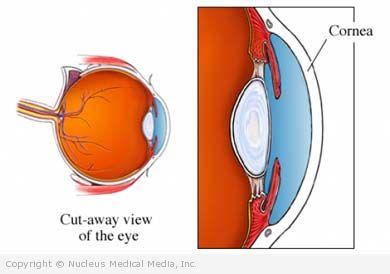Corneal Abrasion
(Scratched Cornea)
Corneal abrasion – Definition
A corneal abrasion is a scratch on the cornea. The cornea is the clear, front surface of the eye. It is located directly in front of the iris, the colored part of the eye. The cornea has several layers that protect the eye. Some corneal abrasions may form a scar and permanently impair vision.
Corneal abrasion – Causes
Most corneal abrasions happen as a result of:
- Dust, dirt, sand, wood slivers, or metal shavings hitting the eye
- Vigorously rubbing the eye, especially when something is in it
- A fingernail, tree branch, or other object scratching the eye
- Wearing contact lenses, especially if the lenses are worn longer than directed or not cleaned properly
- Not protecting the eyes during surgery — If your eyes are not fully shut while under general anesthesia, the corneae can dry out and even sometimes lead to an abrasion.
Certain eye disorders
Corneal abrasion – Risk Factors
A risk factor is something that increases your chance of getting a disease or condition.
Risk factors for a corneal abrasion include:
- Having a dry or weak cornea
- Wearing contact lenses
- Working in a setting with eye hazards, such as metal working or gardening
- Participating in sports where accidental eye injuries can occur
Corneal abrasion – Symptoms
Symptoms may include:
- Pain that may worsen when opening or closing the eye
- A feeling that a foreign object is in your eye
- Blurred vision
- Tearing
- Redness
- Sensitivity to light
- Headache
Corneal abrasion – Diagnosis
The doctor will ask about your symptoms and perform an eye exam. The doctor will look for any foreign objects in the eye. He or she may place drops in your eye to make you more comfortable and to aid in seeing the scratch under a special light. You will usually be referred to an eye specialist.
Corneal abrasion – Treatment
Minor scratches usually heal within 1-2 days. Your eye may be patched for improved comfort. In some cases, your eye doctor will place a contact lens in the eye to help relieve the discomfort and improve healing. The doctor will likely ask you to come back often to make sure the abrasion is healing.
Treatment may include:
Removing a Foreign Object
The doctor will remove the foreign object by flushing the eye with saline or by using a cotton swab, needle, or other tool. You may need to wear a patch over your eye.
Medication
Medications may include:
- Antibiotic eye drops or ointment to prevent infection
- Pain medications as needed
Self-care
Always go to an eye doctor immediately if your eye is bothering you. Besides treatment prescribed by your eye doctor, self-care may include:
- Do not rub your eye. Rubbing may worsen the abrasion.
- If you are not wearing an eye patch, moist compresses may help relieve the pain.
- Do not put your contact lenses back in your eye until you get your doctor’s approval.
If you are diagnosed with a corneal abrasion, follow your doctor’s instructions.
Corneal abrasion – Prevention
Prevention aims to avoid injury to the cornea or provide early treatment should an injury occur. If something scratches or penetrates one of your eyes, seek medical attention immediately.
To avoid injuring the cornea:
- Do not rub your eyes.
- Wear safety glasses or protective goggles when participating in sports, yard work, construction, or other activities that could injure your eyes. It is best to wear goggles that fully surround your eyes and touch your skin. Otherwise, foreign objects can still fly up under the glasses and into your eyes. This is especially important during work with any potentially high-velocity objects, such as hammering a nail or grinding metal.
- Wash your hands before handling your contact lenses. Clean and wear contact lenses as directed. Never sleep in your contact lenses unless approved by your eye doctor.
If something gets in your eye:
- Try to flush it out with water. Splash the water so it drains toward the side of your head, not toward your nose and other eye.
- Do not rub your eye.
- Call your doctor.
If an object strikes your eye at a fast pace, it can be a medical emergency. Seek medical attention immediately.
If a chemical splashes into your eyes, flush your eyes immediately and call 911.
Special Tip: If you do have eye pain or a foreign object, consider seeing an eye specialist immediately rather than going to the emergency room as many emergency rooms will need to refer you to an eye specialist anyway. However, if you have a severe injury or chemical splash, call 911 or go immediately to the nearest emergency room.

